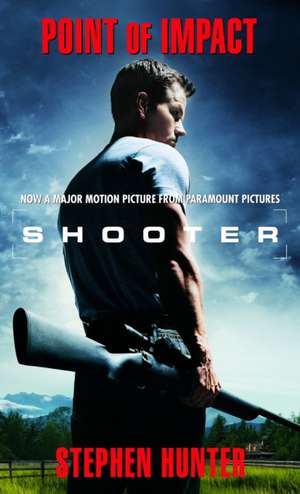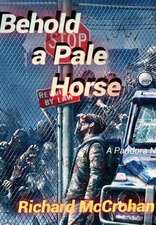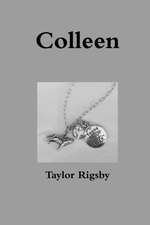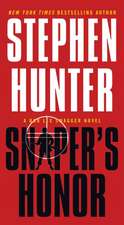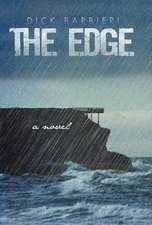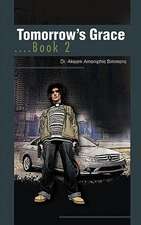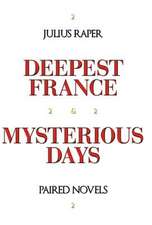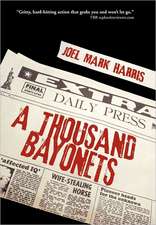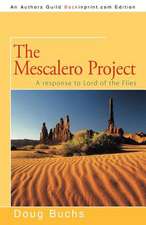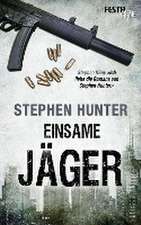Point of Impact
Autor Stephen Hunter, Baker Sidney MacDonalden Limba Engleză Paperback – 31 oct 1993
But with consummate psychological skill, a shadowy military organization seduces Bob into leaving his beloved Arkansas hills for one last mission for his country, unaware until too late that the game is rigged.
The assassination plot is executed to perfection—until Bob Lee Swagger, alleged lone gunman, comes out of the operation alive, the target of a nationwide manhunt, his only allies a woman he just met and a discredited FBI agent.
Now Bob Lee Swagger is on the run, using his lethal skills once more—but this time to track down the men who set him up and to break a dark conspiracy aimed at the very heart of America.
Preț: 60.17 lei
Nou
Puncte Express: 90
Preț estimativ în valută:
11.52€ • 11.90$ • 9.58£
11.52€ • 11.90$ • 9.58£
Carte disponibilă
Livrare economică 05-19 martie
Preluare comenzi: 021 569.72.76
Specificații
ISBN-13: 9780553563511
ISBN-10: 0553563513
Pagini: 592
Dimensiuni: 106 x 174 x 34 mm
Greutate: 0.28 kg
Editura: Bantam Books
ISBN-10: 0553563513
Pagini: 592
Dimensiuni: 106 x 174 x 34 mm
Greutate: 0.28 kg
Editura: Bantam Books
Notă biografică
Bestselling author Stephen Hunter is a staff writer and film critic for The Washington Post and winner of The American Society of Newspaper Editors Award for Distinguished Writing in Criticism (1998), as well as the 2003 Pulitzer Prize for film criticism that is "intellectually rewarding and a pleasure to read." He has written 11 novels, including Havana, Pale Horse Coming, Hot Springs, Time to Hunt, Black Light, Dirty White Boys, and The Day Before Midnight.
Extras
Chapter One
It was November, cold and wet in west Arkansas, a miserable dawn following on a miserable night. Sleet whistled through the pines and collected on the humps of stone that jutted out of the earth; low overhead, angry clouds hurtled by. Now and then the wind would rush through the canyons between the trees and blow the sleet like gunsmoke. It was the day before hunting season.
Bob Lee Swagger had placed himself just off the last climb that led up to Hard Bargain Valley, that flat splurge of tabletop high in the Ouachitas, and he sat in perfect silence and perfect stillness against an old pine, the rifle across his knees. This was Bob's first gift: the gift of stillness. He acquired it naturally, without instruction, from some inner pool where stress never reached. Back in 'Nam he was something of a legend for the nearly animallike way he could will his body reactions down, stiller than death.
The cold had fought through his wool leggings and up and under his down vest and begun to climb up his spine, like a sly little mouse. He gritted his teeth, fighting the urge to let them chatter. Now and then his hip throbbed from a wound from long ago. He instructed his brain to ignore the phantom ache. He was beyond will. He was in some other place.
He was earning Tim.
You see, he'd tell you, if you were one of the two or three men in the world he talked to–old Sam Vincent, say, the ex-Polk Country prosecutor, or maybe Doc LeMieux, the dentist, or Vernon Tell, the sheriff–you can't just shoot an animal. Shooting's the easy part. Any city dick can sit in a stand, drink hot coffee and wait till some doe goes prancing by, close enough to touch, and then put the muzzle of his Wal-Mart rifle and squeeze-jerk the trigger and blow a quart of her guts out and find her three counties away, bled out, her eyes still somehow beaming dumb pain.
You earned your shot, Bob would tell you, by letting whatever was happening to the animal happen to you and for however long. Fair was fair, after all.
Through the pines and the saplings, he could see the clearing 150 yards ahead, a little below, coming gradually into what small, low light there'd be that day. A trail ran through it, and at dawn and again at twilight he knew the animals would filter through, one by one, a buck and his harem. Last night, Bob had seen twelve, three bucks, one a nice fat eight-pointer even, and their ladies.
But he'd come for Tim. Old Tim, scarred and beat up, with many an adventure behind him. Tim would be alone, too: Tim didn't have a harem, and didn't need one anymore. One year Tim had had a prong of antler shot off by some lucky city dick from Little Rock and looked out of balance for a whole season. Tim had limped another whole year because Sam Vincent, not as spry as once he'd been, had held sloppy and put a .45-70 softpoint–too much gun, but Sam loved that old Winchester–into his haunches, and only bled him bad enough to kill any normal buck.
Tim was tough, Bob knew, and that was the kindest word he had for anybody, living or dead.
Bob was in his seventeenth hour of sitting. He had sat all night in the cold; and when, about four, sleet had started, he still sat. He was so cold and wet he was hardly alive, and now and again a picture of another time would come up before his eyes but always, he'd shake it out, keeping himself set on what lay ahead 150 yards.
Come on, you old bastard, he was thinking. I'm earning you.
Then he saw something. But it was only a doe and her fawn and in their lazy, confident, stupid animal way they came down the trail from the hill and began to move on down to graze in the lower forest, where some lucky city fool would certainly kill them.
Bob just sat there, next to his tree.
Dr. Dobbler swallowed, trying to read the mystery in Colonel Shreck's eyes. But as always, Shreck sat there with a fierce scowl masking his blunt features, radiating power and impatience and somehow scaring everybody in the room. Shreck was scary. He was the scariest man Dobbler had ever known, scarier even than Russell Isandhlwana, the dope dealer who had raped Dobbler in the showers of Norfolk State Penitentiary in Massachusetts and made the doctor his punk for a very, very long three months.
It was late. Outside the rain drummed on the tin roof of the Quonset. A stench of resting metal, old leather, dust, unwashed socks and stale beer hung in the room; it was a prison smell, though this wasn't a prison, but the field headquarters of an outfit calling itself RamDyne Security on several hundred obscure acres of untillable central Virginia.
The planners sat in front of the darkened room; the brutish Jack Payne, the second scariest man in the world, sat across the table; and that was all, such a tiny team for the immense and melancholy task that lay ahead of them.
On a small screen, four faces had been projected, now glowing in the dark. Each represented a hundred other possibilities; these men had been discovered by Research, investigated at length by Plans, watched by the pros from Operations, and then winnowed to this sullen quartet. It was Dobbler's job to break them down psychologically for Colonel Raymond Shreck's final decision.
Each of the final four had a flaw, of course. Dr. Dobbler pointed these out. He was, after all, still a psychiatrist, if now uncertified. Flaws were his profession.
"Too narcissistic," he said of one. "He spends too much on his hair. Never trust a man in a seventy-five-dollar haircut. He expects to be treated special. We need somebody who is special but has never been treated special."
As for Number 2, "Too smart. Brilliant, tactically brilliant. But always playing the games. Always thinking ahead. Never at rest."
Of the third, "Wonderfully stupid. But slow. Exactly what we need so far as certain qualities are required, and experienced in the technical area. Obedient as a dog. But slow. Too slow, too literal, too eager to please. Too rigid."
"I hear you flirting again, Dobbler," said Colonel Shreck, brutally. "Just give us the information, without the charm."
Dobbler winced.
"Well," he finally said, "that leave us with only one."
Jack Payne hated Dobbler. The softy Dobbler, with his big head, scraggly beard and long sensitive fingers, was everything pussy in the world. He had tits. He was almost a woman. He tried to turn everything into show.
Jack Payne was a dour, nasty-looking little man, tattooed and remote, with blank, tiny eyes in his meaty face. He was enormously strong, with a pain threshold that was off the charts. His specialty was getting things done, no matter what. He touched the cut-down Remington 1100 in its custom under-shoulder rig beneath his left arm. In the long tube under the barrel there were six double-ought 12-gauge shells. In each shell were nine .32 caliber pellets. He could fire fifty-four bullets in less than three seconds. Got lots of stuff done with that.
"The details are impressive," Dobbler was saying. "He killed eighty-seven men. That is, eighty-seven men stalked and taken under the most ferocious conditions. I think we'd all have to agree that's impressive."
There was a pause.
"I killed eighty-seven men in an afternoon," Jack said.
Jack had been stuck in a long siege at an A-team camp in the southern highlands, and in the last days the gooks had thrown human wave attacks at them.
"But all at once. With an M-60," said Colonel Shreck. "I was there too. Go ahead, Dobbler."
Dobbler was trembling, Jack could see. He still trembled when the colonel addressed him directly sometimes. Jack almost laughed. He smelled fear on the psychiatrist. He loved the odor of other men's fear.
But Dobbler pressed ahead. "This is none other than Gunnery Sergeant Bob Lee Swagger, USMC, retired, of Blue Eye, Arkansas. They called him 'Bob the Nailer.' He was the United States Marine Corps's second leading individual killer in Vietnam. Gentlemen, I give you the great American sniper."
Bob loved their magic. When he had hunted men, there was no magic. Men were stupid. They farted and yakked and gave themselves away miles before they moved into the killing zone.
But the deer, particularly the old Ouachita stags, appeared like ghosts, simply exploding out of brushy nothingness, as if they were superior visitors from another planet. And they were superior, in their way, Bob knew: their senses so razor keen, everything focused on the next two minutes. That was their secret. They didn't think about the last two minutes, which had ceased entirely to exist in the second after they were experienced, had evaporated entirely. They only thought about the next two minutes. No past, no real future. There was only now.
And so when Tim materialized with the force of a sharp memory out of the thin Arkansas pines, stunning Bob with his beauty, he did not quite surprise him.
Bob had learned years back in hard places that surprise was dangerous. It made you jerk awkwardly upon the first moment of encounter, and you gave away your edge.
So Bob's initial reaction to Tim was nothing that his body showed.
He was downwind, so no odors would reach Tim's keen nostrils, though Bob of course had washed yesterday with odorless soap; he'd air-dried his clothes; he'd washed his mouth out with peroxide so no tang of toothpaste could hang in the forest air.
The animal's head twitched and turned, and unerringly turned to Bob.
You can't see me, Bob thought. I know how you operate. You can see motion, you're a smart boy at picking out a flick of motion, scampering off to safety; but you can't see pattern. Here I sit, and you're looking right at me and you can't see me.
Bob let the beast's gaze wash over him, then felt it slide away. This was the part he liked the best, the exciting fragility of it all, the flimsiness of the connections that brought buck and man together through the medium of the rifle, but only for a few seconds, and knowing that in a minute, if the buck held, if the wind held, if his nerve held, if his luck held, he'd have Tim in his cross hairs.
He lifted the rifle.
It was a Remington 700 bolt action, lovingly purchased by the Marine Marksmanship Team and presented to him as a retirement gift when he'd been invalided out of the Corps in 1975. It had a heavy varmint barrel which almost neutralized vibration when he fired, though Bob had since replaced the original barrel with a stainless steel one from Hart, which he'd then finished with Teflon so the whole piece had the appearance of old pewter. The barrel, action and even the screws were bedded in Devcon aluminum into a black fiberglass and Kevlar stock. The screws were torqued through aluminum pilars, tightened to sixty pounds. The rifle was purely ugly. It was a .308 Winchester, and one of Bob's own handloads now rested in the chamber.
Bob slid the rifle up in a smooth and practiced motion, economical from long years of repetition. Under slightly less adverse conditions he would have elected the prone, the stablest shooting position, but since he knew he'd have to be still for so long he had been afraid the contact with the cold ground would chill his body numb. Instead, he drew the rifle up to his shoulder, notching his elbows inside his splayed knees, canting his shoulders, locking his arms under the rifle's ten pounds so that it was supported off bone, not muscle; he was building a bone bridge, running from the piece itself to the ground, anchoring it so that no whimsy of muscle fiber, no throb of heart or twitch of pulse, could deflect him at the last moment.
Bob's eye slid behind the scope, a Leupold 10x. The bold optics of the magnification, snatching every bit of light from the air, threw up Tim's head and shoulders ten time the size of life. Again the animal turned toward him, though this time he was projected against the intersection of the cross hairs.
With a thumb, Bob snicked off the safety and settled in to shoot.
I've earned you, you son of a bitch, he thought. And by God I own your ass. You are mine.
His heart seemed to thump a bit. Now he was trying to slip into that calm pool of near-nothingness where the little patch on the tip of his finger just took over as if on auto-pilot, reading the play of the cross hairs, matching their rhythm, anticipating their direction.
Okay, Bob thought, as he made the minute corrections and the cross hairs settled on Tim's spine as he nimbly licked ice-glazed shoots from a tree, okay now I own you.
It was November, cold and wet in west Arkansas, a miserable dawn following on a miserable night. Sleet whistled through the pines and collected on the humps of stone that jutted out of the earth; low overhead, angry clouds hurtled by. Now and then the wind would rush through the canyons between the trees and blow the sleet like gunsmoke. It was the day before hunting season.
Bob Lee Swagger had placed himself just off the last climb that led up to Hard Bargain Valley, that flat splurge of tabletop high in the Ouachitas, and he sat in perfect silence and perfect stillness against an old pine, the rifle across his knees. This was Bob's first gift: the gift of stillness. He acquired it naturally, without instruction, from some inner pool where stress never reached. Back in 'Nam he was something of a legend for the nearly animallike way he could will his body reactions down, stiller than death.
The cold had fought through his wool leggings and up and under his down vest and begun to climb up his spine, like a sly little mouse. He gritted his teeth, fighting the urge to let them chatter. Now and then his hip throbbed from a wound from long ago. He instructed his brain to ignore the phantom ache. He was beyond will. He was in some other place.
He was earning Tim.
You see, he'd tell you, if you were one of the two or three men in the world he talked to–old Sam Vincent, say, the ex-Polk Country prosecutor, or maybe Doc LeMieux, the dentist, or Vernon Tell, the sheriff–you can't just shoot an animal. Shooting's the easy part. Any city dick can sit in a stand, drink hot coffee and wait till some doe goes prancing by, close enough to touch, and then put the muzzle of his Wal-Mart rifle and squeeze-jerk the trigger and blow a quart of her guts out and find her three counties away, bled out, her eyes still somehow beaming dumb pain.
You earned your shot, Bob would tell you, by letting whatever was happening to the animal happen to you and for however long. Fair was fair, after all.
Through the pines and the saplings, he could see the clearing 150 yards ahead, a little below, coming gradually into what small, low light there'd be that day. A trail ran through it, and at dawn and again at twilight he knew the animals would filter through, one by one, a buck and his harem. Last night, Bob had seen twelve, three bucks, one a nice fat eight-pointer even, and their ladies.
But he'd come for Tim. Old Tim, scarred and beat up, with many an adventure behind him. Tim would be alone, too: Tim didn't have a harem, and didn't need one anymore. One year Tim had had a prong of antler shot off by some lucky city dick from Little Rock and looked out of balance for a whole season. Tim had limped another whole year because Sam Vincent, not as spry as once he'd been, had held sloppy and put a .45-70 softpoint–too much gun, but Sam loved that old Winchester–into his haunches, and only bled him bad enough to kill any normal buck.
Tim was tough, Bob knew, and that was the kindest word he had for anybody, living or dead.
Bob was in his seventeenth hour of sitting. He had sat all night in the cold; and when, about four, sleet had started, he still sat. He was so cold and wet he was hardly alive, and now and again a picture of another time would come up before his eyes but always, he'd shake it out, keeping himself set on what lay ahead 150 yards.
Come on, you old bastard, he was thinking. I'm earning you.
Then he saw something. But it was only a doe and her fawn and in their lazy, confident, stupid animal way they came down the trail from the hill and began to move on down to graze in the lower forest, where some lucky city fool would certainly kill them.
Bob just sat there, next to his tree.
Dr. Dobbler swallowed, trying to read the mystery in Colonel Shreck's eyes. But as always, Shreck sat there with a fierce scowl masking his blunt features, radiating power and impatience and somehow scaring everybody in the room. Shreck was scary. He was the scariest man Dobbler had ever known, scarier even than Russell Isandhlwana, the dope dealer who had raped Dobbler in the showers of Norfolk State Penitentiary in Massachusetts and made the doctor his punk for a very, very long three months.
It was late. Outside the rain drummed on the tin roof of the Quonset. A stench of resting metal, old leather, dust, unwashed socks and stale beer hung in the room; it was a prison smell, though this wasn't a prison, but the field headquarters of an outfit calling itself RamDyne Security on several hundred obscure acres of untillable central Virginia.
The planners sat in front of the darkened room; the brutish Jack Payne, the second scariest man in the world, sat across the table; and that was all, such a tiny team for the immense and melancholy task that lay ahead of them.
On a small screen, four faces had been projected, now glowing in the dark. Each represented a hundred other possibilities; these men had been discovered by Research, investigated at length by Plans, watched by the pros from Operations, and then winnowed to this sullen quartet. It was Dobbler's job to break them down psychologically for Colonel Raymond Shreck's final decision.
Each of the final four had a flaw, of course. Dr. Dobbler pointed these out. He was, after all, still a psychiatrist, if now uncertified. Flaws were his profession.
"Too narcissistic," he said of one. "He spends too much on his hair. Never trust a man in a seventy-five-dollar haircut. He expects to be treated special. We need somebody who is special but has never been treated special."
As for Number 2, "Too smart. Brilliant, tactically brilliant. But always playing the games. Always thinking ahead. Never at rest."
Of the third, "Wonderfully stupid. But slow. Exactly what we need so far as certain qualities are required, and experienced in the technical area. Obedient as a dog. But slow. Too slow, too literal, too eager to please. Too rigid."
"I hear you flirting again, Dobbler," said Colonel Shreck, brutally. "Just give us the information, without the charm."
Dobbler winced.
"Well," he finally said, "that leave us with only one."
Jack Payne hated Dobbler. The softy Dobbler, with his big head, scraggly beard and long sensitive fingers, was everything pussy in the world. He had tits. He was almost a woman. He tried to turn everything into show.
Jack Payne was a dour, nasty-looking little man, tattooed and remote, with blank, tiny eyes in his meaty face. He was enormously strong, with a pain threshold that was off the charts. His specialty was getting things done, no matter what. He touched the cut-down Remington 1100 in its custom under-shoulder rig beneath his left arm. In the long tube under the barrel there were six double-ought 12-gauge shells. In each shell were nine .32 caliber pellets. He could fire fifty-four bullets in less than three seconds. Got lots of stuff done with that.
"The details are impressive," Dobbler was saying. "He killed eighty-seven men. That is, eighty-seven men stalked and taken under the most ferocious conditions. I think we'd all have to agree that's impressive."
There was a pause.
"I killed eighty-seven men in an afternoon," Jack said.
Jack had been stuck in a long siege at an A-team camp in the southern highlands, and in the last days the gooks had thrown human wave attacks at them.
"But all at once. With an M-60," said Colonel Shreck. "I was there too. Go ahead, Dobbler."
Dobbler was trembling, Jack could see. He still trembled when the colonel addressed him directly sometimes. Jack almost laughed. He smelled fear on the psychiatrist. He loved the odor of other men's fear.
But Dobbler pressed ahead. "This is none other than Gunnery Sergeant Bob Lee Swagger, USMC, retired, of Blue Eye, Arkansas. They called him 'Bob the Nailer.' He was the United States Marine Corps's second leading individual killer in Vietnam. Gentlemen, I give you the great American sniper."
Bob loved their magic. When he had hunted men, there was no magic. Men were stupid. They farted and yakked and gave themselves away miles before they moved into the killing zone.
But the deer, particularly the old Ouachita stags, appeared like ghosts, simply exploding out of brushy nothingness, as if they were superior visitors from another planet. And they were superior, in their way, Bob knew: their senses so razor keen, everything focused on the next two minutes. That was their secret. They didn't think about the last two minutes, which had ceased entirely to exist in the second after they were experienced, had evaporated entirely. They only thought about the next two minutes. No past, no real future. There was only now.
And so when Tim materialized with the force of a sharp memory out of the thin Arkansas pines, stunning Bob with his beauty, he did not quite surprise him.
Bob had learned years back in hard places that surprise was dangerous. It made you jerk awkwardly upon the first moment of encounter, and you gave away your edge.
So Bob's initial reaction to Tim was nothing that his body showed.
He was downwind, so no odors would reach Tim's keen nostrils, though Bob of course had washed yesterday with odorless soap; he'd air-dried his clothes; he'd washed his mouth out with peroxide so no tang of toothpaste could hang in the forest air.
The animal's head twitched and turned, and unerringly turned to Bob.
You can't see me, Bob thought. I know how you operate. You can see motion, you're a smart boy at picking out a flick of motion, scampering off to safety; but you can't see pattern. Here I sit, and you're looking right at me and you can't see me.
Bob let the beast's gaze wash over him, then felt it slide away. This was the part he liked the best, the exciting fragility of it all, the flimsiness of the connections that brought buck and man together through the medium of the rifle, but only for a few seconds, and knowing that in a minute, if the buck held, if the wind held, if his nerve held, if his luck held, he'd have Tim in his cross hairs.
He lifted the rifle.
It was a Remington 700 bolt action, lovingly purchased by the Marine Marksmanship Team and presented to him as a retirement gift when he'd been invalided out of the Corps in 1975. It had a heavy varmint barrel which almost neutralized vibration when he fired, though Bob had since replaced the original barrel with a stainless steel one from Hart, which he'd then finished with Teflon so the whole piece had the appearance of old pewter. The barrel, action and even the screws were bedded in Devcon aluminum into a black fiberglass and Kevlar stock. The screws were torqued through aluminum pilars, tightened to sixty pounds. The rifle was purely ugly. It was a .308 Winchester, and one of Bob's own handloads now rested in the chamber.
Bob slid the rifle up in a smooth and practiced motion, economical from long years of repetition. Under slightly less adverse conditions he would have elected the prone, the stablest shooting position, but since he knew he'd have to be still for so long he had been afraid the contact with the cold ground would chill his body numb. Instead, he drew the rifle up to his shoulder, notching his elbows inside his splayed knees, canting his shoulders, locking his arms under the rifle's ten pounds so that it was supported off bone, not muscle; he was building a bone bridge, running from the piece itself to the ground, anchoring it so that no whimsy of muscle fiber, no throb of heart or twitch of pulse, could deflect him at the last moment.
Bob's eye slid behind the scope, a Leupold 10x. The bold optics of the magnification, snatching every bit of light from the air, threw up Tim's head and shoulders ten time the size of life. Again the animal turned toward him, though this time he was projected against the intersection of the cross hairs.
With a thumb, Bob snicked off the safety and settled in to shoot.
I've earned you, you son of a bitch, he thought. And by God I own your ass. You are mine.
His heart seemed to thump a bit. Now he was trying to slip into that calm pool of near-nothingness where the little patch on the tip of his finger just took over as if on auto-pilot, reading the play of the cross hairs, matching their rhythm, anticipating their direction.
Okay, Bob thought, as he made the minute corrections and the cross hairs settled on Tim's spine as he nimbly licked ice-glazed shoots from a tree, okay now I own you.
Recenzii
"Hunter passes almost everybody else in the thriller-writing trade as if they were standing still...worth every extravagant rave." —New York Daily News
Descriere
Tense and brilliant, Stephen Hunter's newest thriller unleashes a staggering conspiracy aimed point-blank at America's heart.
